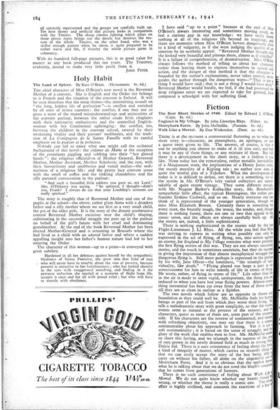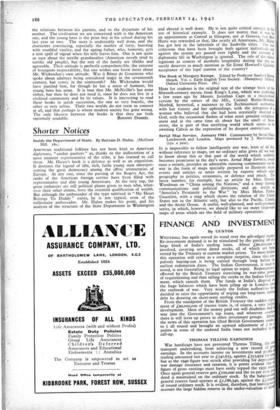Fiction
The Best Short Stories of 1940. Edited by Edward J. O'Brien. (Cape. 8s. 6d.) THERE is at the moment a controversial fluttering as to what the short story is—character, an atmosphere, an apologue, or just a queer twist given to life. The answer, of course, is that it can be anything you choose to make of it (if you can), and that it may be any of these things, or any mixture of them. But still there is a development in the short story, or a fashion if you like. None today has the remorseless, rather metallic inevitability of a Maupassant story, the implications of a Henry James story, the sturdy morality of a Kipling tale ; no author now aims at quite the wistful pity of a Tchehov. What the development of today is it is difficult to define, yet there is a something, for all the stories in Mr. O'Brien's very varied collection are unmis- takably of quite recent vintage. They seem different enough, with Mr. Nugent Barker's Kafka-like story, Mr. Beachcroft's sympathetic little affair, the typical Hemingway, the rather pro- founder Erskine Caldwell, and so on. Nearly everyone one can think of is represented of the younger generation, though we miss Miss Elizabeth Bowen. Certainly there is something for every taste, the brutally tough, the ironic, the tender, and, though there is nothing funny, there are one or two that appeal to the comic sense, and the effects are always carefully built up. Al the stories are, indeed, a little sophisticated. There is nothing sophisticated in the stories told by the late Flight-Lieutenant J. LI. Rhys. All the while you feel that Rhys was striving to express in writing what possibly can only be expressed in the act of flying, of flying, too, into action against an enemy, for England is My Village contains what were probably the first flying stories of this war. They are not always successful stories, and the touch is sometimes uncertain, but they do succeed in giving the impression of that almost metaphysical struggle that dangerous flying is. Still more perhaps is expressed in the preface by his wife, Jane Oliver—the loneliness, " the triumph of. Ind?. viduality, like death." " Flying played too large a part m10 consciousness for him to write merely of life in terms of flying He wrote, rather, of flying in terms of life." Life other than lie in the air is made to seem vapid, unimportant, the thing you ate reduced to when you have lost your flying powers. Almost every- thing inessential has been cut away from the best of these steno till they are as clean in outline as a Spitfire. The two novels which follow are as opposite in theme and foundation as they could well be. Mr. McNeillie feels his human beings as part of the soil from which they wrest their living. Ile tells a melodramatic story with great simplicity, so that the viola events seem as natural as the process of the seasons, and It characters, queer as some of them are, seem part of the courier!: side. If his characters are the reverse of sentimental, and treated .with refreshing objectivity, one may say that there is a cello sentimentality about his approach to farming. Yet it is not I soft sentimentality ; it is based on the sense of struggle,.and glory of the work that enables men to live. Mr. McNeilhe us share this feeling, and we triumph in the success of the creP of oats grown in the newly drained field as much as young ,A011 Dalzie did. There is a sure consistency of feeling about the hoT3
a kind of integrity of matter, which carries us securely AV& that we can easily accept the story of the boy being ahl! 0
carry on without his father, all alohe on the ungrateful sod _tt Morryharn Farm. And it is so obvious that the author le107 what he is talking about that we do not need the blurb's assuraliv that he comes from generations of farmers.
There is no such consistency of feeling about Walk La° Mortal. We do not quite know whethei our hearts should
wrung, or whether the theme is really a comic one. The nh affair is highly civilised, and concerns the reactions of a boy
the relations between his parents, and to the departure of his mother. The civilisation we are concerned with is the American one, and the young hero is the prize boy at his school during his last year or two. The story is undeniably well done, and the characters convincing, especially the mother of forty, bursting with youthful vitality, and the ageing father, who, however, gets a new spell of vigour when his wife leaves him. One is not quite so sure about the terrific grandmother (American novels tend to terrific old people), but the rest of the family are lifelike and agreeable. Their attitude is perfectly comprehensible, the extreme of bourgeois respectability, but one wishes one knew more about Mr. Wickenden's own attitude. Was it Remy de Gourmont who spoke about adultery being considered tragic in the seventeenth century, but comic in the nineteenth? Mr. Wickenden would have puzzled him, for though he has a sense of humour, his young hero has none. It is true that Mr. McNeillie's has none either, but then he does not need it, since he does not live in a civilised community and by its values. It is interesting to read these books in quick succession, the one so very bucolic, the other so very urban. Their two worlds do not seem to connect at all, and that perhaps is where modern society has gone wrong. The only likeness between the books is that they arc both































 Previous page
Previous page